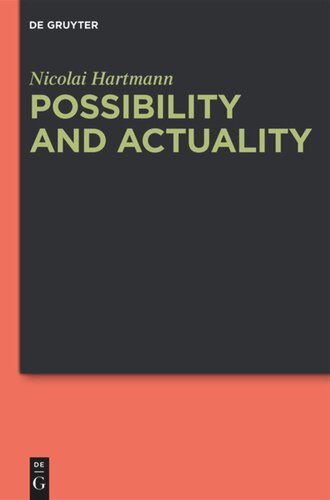

Most ebook files are in PDF format, so you can easily read them using various software such as Foxit Reader or directly on the Google Chrome browser.
Some ebook files are released by publishers in other formats such as .awz, .mobi, .epub, .fb2, etc. You may need to install specific software to read these formats on mobile/PC, such as Calibre.
Please read the tutorial at this link: https://ebookbell.com/faq
We offer FREE conversion to the popular formats you request; however, this may take some time. Therefore, right after payment, please email us, and we will try to provide the service as quickly as possible.
For some exceptional file formats or broken links (if any), please refrain from opening any disputes. Instead, email us first, and we will try to assist within a maximum of 6 hours.
EbookBell Team

5.0
38 reviewsNicolai Hartmann's Possibility and Actuality is the second volume of a four-part investigation of ontology. It deals with such questions as: How do we know that something is really possible? Is the possible only the actual? Is the actual only the possible? What is the difference between ideal and real possibility?
This groundbreaking work of modal analysis describes the logical relations between possibility, actuality, and necessity, and it provides insight into the relations between modes of knowledge and modes of being.
Hartmann reviews the history of philosophical concepts of possibility and necessity, from ancient Megarian philosophy to Aristotle, to Medieval Scholasticism, to Leibniz, Kant, and Hegel. He explains the importance of modal analysis as a basic investigative tool, and he proposes an approach to understanding the nature of human existence that unifies the fields of ontology, modal logic, metaphysics, and epistemology.
This brilliant and fascinating work is relevant to many topics of debate in contemporary philosophy, including the ontology of possible worlds, the metaphysics of modality, the logic of counterfactual conditionals, and modal epistemology. It illuminates the nature of real, ideal, logical, and epistemic possibility.